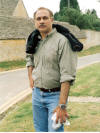|
|
the-south-asian.com July / August 2006 |
|
|||
|
August/September Contents
Sufis - wisdom against 50
years of mountain Heritage cities:
Cotton - the fibre of
|
|
||||
|
Page 4 of
4 Sufis - Wisdom against Violence (cntd.) by Salman Minhas
First published April 2001
The story goes that Madho Lal [a Hindu Brahmin] and Shah Hussain [a Muslim Sufi] were great friends and to immortalise the friendship between the two, Shah Hussain decided to call himself Madho Lal Hussain.
Outside the walls of the Shalamar Gardens in Lahore, there is held an annual festival at the time of Spring harvest called "Mela Chiraghan" or the Festival of Lights, close to the grave of Lal Hussain. In the songs of the village minstrels and the dancers' movements, the myth of Lal Hussain once again is reborn. Grandson of a convert weaver, Lal Hussain embarrassed everyone by aspiring to the privilege of learning. Hussainís poetry consists entirely of short poems known as "Kafis", usually 4 to ten lines, designed for musical compositions, to be interpreted by the singing voices. The rhythm and the refrain are so balanced as to bring about a varying, evolving musical pattern... folk songs that draw on the emotional experience of the community.... record the reactions to the cycle of birth and the play of desire against the rhythms of hope , despair, exultation and nostalgia. Today most of these Kafis are sung, by well know singers and some have even been used as songs in the Indian Film Industry. Madho Lal Hussain's Kafis All translations are from Najam Hosainís book quoted above. Lifeís Journey - limits & boundaries
Main wi janan dhok
Ranjhan di, naal mare koi challey Travelers, I too have to go; I have to go to the solitary hut of Ranjha. Is there any one who will go with me? I have begged many to accompany me and now I set out alone. Travelers, is there no one who could go with me? The River is deep and the shaky bridge creaks as people step on it. And the ferry is a known haunt of tigers. Will no one go with me to the lonely hut of Ranjha? During long nights I have been tortured by my raw wounds. I have heard he in his lonely hut knows the sure remedy. Will no one come with me, travelers? ______________________
On separation
Sujjen bin raatan hoiyan
wadyan
Nights swell and merge
into each other as I stand await for him. ____________ Female freedom
Ni Mai menoon Kherian di
gal naa aakh Do not talk of the Kheras* to me,
Oh mother do not . *The Kheras were a wealthy family. Bulleh Shah [1680-1758] The ancestral village of Bulleh Shah was Uch Gilaniyan in Bahawalpur, Pakistan. From there his family first shifted to Malakwal (District Multan, Pakistan) and then to Pandoke, which is about 14 miles southeast of Qasur (Pakistan). Bulleh's earlier name was Abdullah Shah, later on it changed to Bulleh. His family background was religious, his father being a highly religious person. Bulleh Shah was the disciple of a Qadiri Sufi. Bulleh composed a lot of poetry in Saraiki, the local spoken language. His style of poetry is called Qafi, which was already an established style with Sufis who preceded him. The tomb of Bulleh Shah is in Qasur (Pakistan) and he is held in reverence by all Sufis of Sindh and Punjab. The poem below is typical of Bullehís view of the world. He sees the common underlying reality that lies beneath the mundane, and rejoices in its all pervasiveness. This concept is similar to the monotheistic, omnipresent concept of God that we come across in Sikhism and the Upanishads.
"Maati kudam karendee
yaar,
"The soil is in ferment,
O friend [Translation reference: book by J. R. Puri and T. R. Shangari of the Radha Swamis, titled Bulleh Shah]. According to the authors this kafi of Bulleh Shah reflects a tumultuous time in the history of Punjab. The poet perceives radical changes taking place in society around him. This was the middle of 18th century when the Sikh power was in the ascendancy and the Mughal power was waning. It was a time of chaos as there was no law and order. Bulleh Shah sees rampant corruption and societal decay. The general tone of the poem is pessimistic, as is obvious.
"Ulte hor zamane aaye,
"Perverse times have
come,
Dohra - Bulleh Shah " Pi sharaab tey kha kabab, heth baal haddaan di ag, Bulleha bhan ghar rab da, ais thuggan de thug noo thug." Drench yourself in wine and feast on roasted flesh, roasting in the fires flaming out of the bones. O Bulleha, break into the house of God and swindle the cheat of cheats.
Note the commonalties found between Bulleh Shah and Shah Lateef who were contemporaries. They had almost the same experiences of the turbulent period in which they lived. Shah Lateef (1690-1752) and Bulleh Shah (1680-1758) had witnessed the death of Aurangzeb, the last of the great Mughals who was responsible for the murder of his brother Dara Shikoh and Sarmad, the Sufi poet. *****
|
|||||
|
Copyright © 2000 - 2006 [the-south-asian.com]. Intellectual Property. All rights reserved. |
|||||

